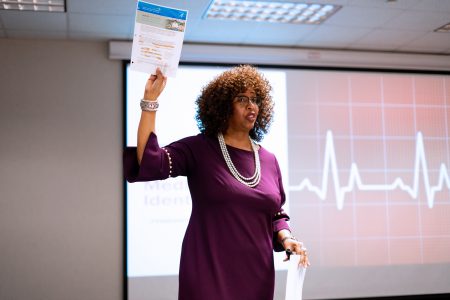By Joanna Donjuan/reporter

Family members and medical staff are the most likely people who will commit identity theft, a speaker told a group Feb. 27 during South Campus’ five-part Financial Literacy Series.
Continuing education instructor of economic development Carole Davis discovered the people who take someone’s medical identity are the closest to them because they have access to that sensitive information.
Unlike credit card theft, victims of medical identity theft aren’t informed by health care providers about any suspicious activity, Davis said.
One risk of medical identity theft is that Medicare may deny coverage or service. It can affect medical and insurance records, credit scores, and most importantly, the victim can receive wrong or harmful treatment, Davis said.
Medical staff like receptionists, nurses and even doctors, people who she said the public trusts, also commit identity theft.
The most common reasons for theft are to pay bills and for medication, and Davis said some people don’t have health insurance to help cover for cost or medication.
Davis said she wants people to pay attention and to look for red flags, check the bills and pay attention to what doctors are charging for, and look for problems with medical insurance.
Davis then read medical privacy rights, also known as HIPAA. Patients also have the right to file a complaint if they believe someone has violated their medical privacy, she said.
“Stay on top of your records,” Davis said.
Medical identity theft is something good to know about because many don’t know these types of things can happen, South student Selbriece Wallace said.
She will leave happy because she feels informed and knows what steps to take in case a situation like this were to happen to her, she said.
South counselor Karnice Caraway said she attended because even though she isn’t at an elderly age where she thinks she should worry, she wants to be informed and able to help and inform others around her.
“It’s something that happens every day,” Caraway said.

